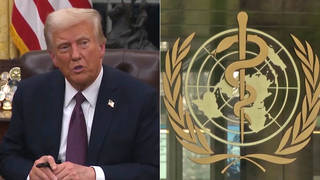
Topics
Guests
- Dr. Christina Propstpediatrician at a private practice in Houston, as well as a member of American Academy of Pediatrics’ Council on Children and Disasters and of the Texas Pediatric Society Committee on Infectious Diseases and Immunizations.
Public health experts in the United States are warning of a possible “tripledemic” of respiratory illness this winter: an increase in COVID cases, an early flu season and a surge in cases of respiratory syncytial virus (RSV). Hospitals in some parts of the U.S. are already seeing a surge in cases of RSV, which usually causes mild, cold-like symptoms but can be very serious for infants. Many respiratory illnesses are “coming back with a vengeance” after ebbing over the last two years due to pandemic mitigation efforts, says pediatrician Dr. Christina Propst. She urges parents of infants to continue to avoid crowds, practice good hygiene and keep up to date on children’s vaccinations in order to slow the spread of RSV. “It is really important to take these commonsense precautions to keep children safe and really to keep our healthcare system afloat at this point,” says Propst.
Transcript
AMY GOODMAN: This is Democracy Now! I’m Amy Goodman, with Nermeen Shaikh.
Public health experts are warning of a “tripledemic” of respiratory illness this winter — an increase in COVID cases, an early flu season, and we look at the surge of cases of this sickness among children called RSV, or respiratory syncytial virus — some hospitals in the U.S. already filled to capacity. RSV starts with mild cold symptoms, can lead to pneumonia, bronchiolitis in very young children, can be life-threatening in infants.
For more, we’re joined by a pediatrician in Houston, Dr. Christina Propst.
Welcome to Democracy Now!, Dr. Propst. Can you explain why this is happening now, why this surge in the United States?
DR. CHRISTINA PROPST: Well, there are several theories as to why we are currently experiencing this very early surge in respiratory syncytial virus and in influenza. One of the theories is that there has been an immunity gap created due to the pandemic. So, when the pandemic hit, of course, everyone was scrambling to figure out how to stay safe and how to avoid infection with the virus that causes COVID-19. Among the features that people isolated as noting to be effective were masking, isolation, hand hygiene, some of the commonsense precautions to avoid a highly contagious viral respiratory pathogen. So, while those are certainly effective and have been proven effective to help prevent the spread of COVID-19, they also helped prevent the spread of other viral pathogens. So, RSV, influenza, rhinovirus, parainfluenza virus — all of these other seasonal viruses that are endemic, really, globally, were suppressed. And so, there is some thought that, number one, those precautions that so effectively suppressed all of those other respiratory viral pathogens, once those precautions were relaxed, as we’re seeing now — people are masking much less often, there is much less social distancing, people are back at work, back in school in person — that now those viruses are, to some extent, coming back with a vengeance.
NERMEEN SHAIKH: And, Dr. Propst, of course, this RSV, as we mentioned, is the most dangerous for infants. Could you explain what the signs are? I mean, I myself have witnessed at very close proximity this virus in an infant below the age of 3 months. It’s very difficult to distinguish RSV from other respiratory illnesses, a cold or a cough. How would you —
DR. CHRISTINA PROPST: That’s true. And so, for most children, and even for most adults, RSV begins as an upper respiratory illness, so cold-like symptoms — nasal congestion, some sneezing, watery eyes. The problem is, for infants, for the immunocompromised, for the elderly, as well, and notably for premature infants, infants under the age of 6 months, or infants and children who have congenital heart disease or immunocompromised or have pulmonary conditions, those folks are particularly vulnerable to getting lower respiratory illness from RSV. And by lower respiratory illness, in babies, we’re referring to bronchiolitis, which is an inflammation of the lower small airways, and even pneumonia. So those are the children we worry about the most, and those are the children who are driving this tremendous uptick in hospitalizations currently.
AMY GOODMAN: We only have a minute, but what can parents do to prevent their babies from getting this illness?
DR. CHRISTINA PROPST: The most important thing, I would say, is, number one, to keep your children safe and avoid being around a lot of other crowds and avoid being around other ill people. So, notably, that is for the most vulnerable population, for babies, for former premature infants. If you have a baby under the age of 6 months, that is — now is not a time to go out to the mall with that baby or to be around a lot of people in a crowded environment. Handwashing, making sure your children are up to date on their vaccines, including their influenza and their COVID vaccine. Coinfection is becoming more of an issue. So, it is really important to take these commonsense precautions to keep children safe and really to keep our healthcare system afloat at this point.
AMY GOODMAN: Dr. Christina Propst, we thank you so much for being with us, a pediatrician in Houston, Texas.
Tune in on November 8th for our three-hour election night special. We’ll begin broadcasting live starting at 9 p.m. Eastern.
That does it for our show. Democracy Now! currently accepting applications for a video news production fellowship and a people and culture manager. Learn more and apply at democracynow.org. I’m Amy Goodman, with Nermeen Shaikh. Thanks for joining us.












Media Options